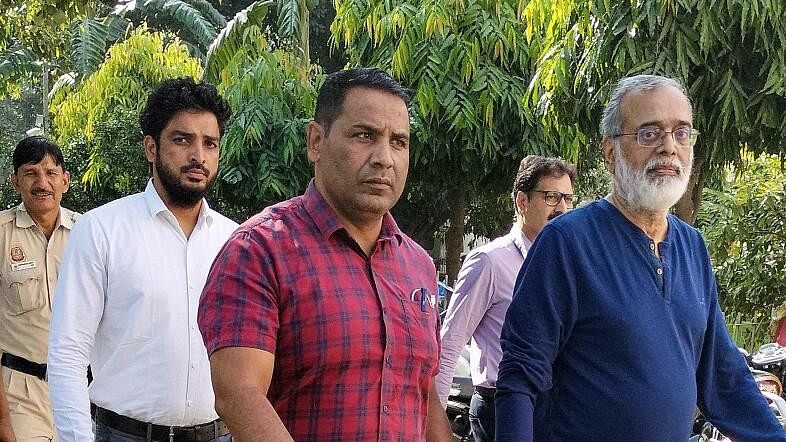
NewsClick founder Prabir Purkayastha (right) being brought to the Patiala House Court by Delhi Police's Special Cell.
Credit: PTI File Photo
New Delhi: In a big embarrassment to Delhi police, the Supreme Court on Wednesday declared arrest and subsequent remand of portal Newsclick's Editor-in-chief Prabir Purkayastha as invalid in the eyes of law for not disclosing the grounds for it in writing to him.
The court held Articles 22(1) (no person to be arrested without informing grounds) and 22(5) (to be informed of grounds of detention) of the Constitution as sacrosanct and such that cannot be breached under any situation.
A bench of Justices B R Gavai and Sandeep Mehta widened the scope of October 3, 2023 judgement in Pankaj Bansal case—which made it mandatory for the Enforcement Directorate to disclose the grounds of arrest in writing to the accused in Prevention of Money Laundering Act—to the anti terror law, the Unlawful Activities Prevention Act or any other offences.
"There is no doubt in the mind of the court that any person arrested for allegation of commission of offences under the provisions of UAPA or for that matter any other offence(s) has a fundamental and a statutory right to be informed about the grounds of arrest in writing and a copy of such written grounds of arrest have to be furnished to the arrested person as a matter of course and without exception at the earliest," the bench said.
The court rejected a fervent plea by Additional Solicitor General S V Raju that there was no requirement under law to communicate the grounds of arrest in writing to the accused appellant.
The bench said, "We have no hesitation in holding that the interpretation of statutory mandate laid down by this court in the case of Pankaj Bansal on the aspect of informing the arrested person the grounds of arrest in writing has to be applied pari passu to a person arrested in a case registered under the provisions of the UAPA."
The court said the purpose of informing to the arrested person the grounds of arrest is salutary and sacrosanct inasmuch as, this information would be the only effective means for the arrested person to consult his advocate; oppose the police custody remand and to seek bail.
"Any other interpretation would tantamount to diluting the sanctity of the fundamental right guaranteed under Article 22(1) of the Constitution of India," the bench said.
The court also pointed out the Right to Life and Personal Liberty is the most sacrosanct fundamental right guaranteed under Articles 20, 21 and 22 of the Constitution of India. Any attempt to encroach upon this fundamental right has been frowned upon by this Court in a catena of decisions and would have to be dealt with strictly.
In the case, the court noted the FIR was lodged on August 17, 2023 but the copy was not provided to the accused appellant despite an application for it, till the police custody remand order was passed.
The accused was arrested on October 3, 2023 and he was presented before the remand judge at his residence sometime before 6:00 am on October 4, 2023.
"This entire exercise was done in a clandestine manner and was nothing but a blatant attempt to circumvent the due process of law; to confine the accused to police custody without informing him the grounds on which he has been arrested; deprive the accused of the opportunity to avail the services of the legal practitioner of his choice so as to oppose the prayer for police custody remand, seek bail and also to mislead the court," the bench said.
In the case, the bench also noted in the remand order two lines were subsequently inserted to state a copy of the remand application has been sent through WhatsApp to the counsel of the accused.
The court rejected an argument by the police as misconceived that the judgment in the case of Pankaj Bansal was delivered on October 3, 2023 and it was uploaded on the website on the late evening, so it would not apply to the present case.
"We are of the firm opinion that once this court has interpreted the provisions of the statute in context to the constitutional scheme and has laid down that the grounds of arrest have to be conveyed to the accused in writing expeditiously, the said ratio becomes the law of the land binding on all the Courts in the country by virtue of Article 141 of the Constitution of India," the bench said.
The court also held the ‘grounds of arrest’ would invariably be personal to the accused and cannot be equated with the ‘reasons of arrest’ which are general in nature.
The court also set aside the Delhi High Court's order of October 13, 2023 which had rejected the writ petition filed against the arrest and remand.
